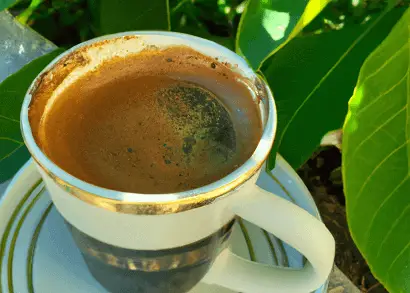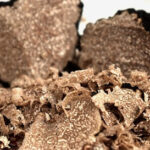Every 10 years or so, it seems there’s a new study released that either purports or negates coffee consumption. Some say a cup of Joe can contribute to healthy practices while others determine it’s horrible for you. But, it’s important to understand that not all types of coffee are the same.

Overall, Greek coffee is excellent for health. It doesn’t raise or impact blood pressure and it doesn’t have as much caffeine as other types of coffee. Plus, it’s low in calories and high in antioxidants, making it great for weight loss and the heart.
There are some studies floating around verifying these benefits. But, the real proof is in how Greeks are notorious for living very long, healthy lives. You honestly don’t need a study to illustrate how beneficial this type of coffee can be.
Does Greek Coffee Raise Blood Pressure?
While you’d think the heat and caffeine content of coffee would raise blood pressure, Greek Coffee doesn’t do this. In fact, a study done by the University of Athens in 2009 studied 142 people over the age of 65 living on the Island of Ikaria. [1]
Around 87% of those people drink Greek coffee every day, even some who have a propensity toward high blood pressure and heart disease. None of them experienced an increase in high blood pressure after consuming a cup.
How Many Calories Are in Greek Coffee?
If you get a Greek coffee without any sugar in it, then this type of java has zero calories. This means it can be a great accompaniment for a weight loss regimen. However, if you get a cup jam-packed with sugar, then the calories will increase exponentially.
The exact amount will depend on how much sugar there is. So, this can be anywhere from eight grams to as much as 30.
How Much Caffeine Does Greek Coffee Have?
Greek coffee has a high caffeine content, but it’s not the highest in comparison with other types of coffee. There are about 50 milligrams (mg) per serving, which pans out to about 25 mg per fluid ounce (fl oz).
To give a visual of comparison, study the chart provided below. It begins with Greek coffee but then moves from the types with the highest amount of caffeine to the least:
| Coffee Type | Mg per Serving | Mg per Fl Oz |
| Greek | 50 mg for a 2 oz serving | 25 mg |
| Filtered | 96 mg for an 8 oz serving | 12 mg |
| Cappuccino | 80 mg for a 6 oz serving | 15 mg |
| Instant | 61.6 mg for an 8 oz serving | 7.7 mg |
| Espresso | 53 mg for a 1 oz serving | 53 mg |
| Decaf | 5.6 mg for an 8 oz serving | 0.7 mg |
Does Greek Coffee Have More Antioxidants than Normal Coffee?
Because of the beans used in Greek coffee along with its brewing process, it contains far more antioxidants than normal coffee. Rich in things like cafestol and kahweol, they help to fight the signs of aging by fending off free radicals. Free radicals are the building blocks of diseases like cancer.
Plus, the particular antioxidants contained within a cup of Greek coffee translate to having anti-inflammatory properties too. This component is also what makes this coffee good for high blood pressure, weight loss, and averting the problems associated with diabetes.
Does Greek Coffee Help You Lose Weight?
Greek coffee does have the capacity to help you lose weight. However, it won’t cause you to lose weight on its own. But, the same 2009 study from Athens found evidence for an increased metabolism by 15% after drinking a cup of Greek coffee, albeit very temporarily.
Even still, you can drink Greek coffee daily and it won’t contribute to excess fat or weight gain. But, you should keep additives like sugar, milk, and cream to a minimum if you can’t cut them out altogether. These are what will up fat and calorie counts in any given food or beverage.
Also, it’s essential to engage in a regular exercise regimen with a proper diet to lose weight effectively. However, you can drink Greek coffee without worrying about adding extra pounds.
Is Greek Coffee Good for Cardiac Health?
Several studies confirm that Greek coffee can reduce the risk of heart attack with better cardiovascular health overall. In reference to the study mentioned above, most locals residing on Ikaria live in excess of 90 years. Plus, several other studies suggest Greek coffee can treat irregular heart rhythms.
This is due to how Greek coffee is chock full of chlorogenic acid, polyphenols, and other healthy phytonutrients. This means Greek coffee can improve heart health by giving a boost to the endothelial system. The endothelium layer lines blood vessels and lifestyle habits along with age can affect it.
Ergo, consuming a cup of Greek coffee every day can boost the endothelium layer and literally clean out the blood vessels. This, in turn, will reduce the risk of coronary heart disease, chances of high cholesterol levels, the occurrence of heart attack, and the potential for strokes.
What Are Greek Coffee’s Additional Health Benefits?
Heart health, low blood pressure, weight loss, and high levels of antioxidants translate into being able to live a long life while averting an early death. Even though this is enough for anyone to jump onto the bandwagon, there are several other bonuses too:
- Diabetes: Plain, black Greek coffee is excellent for treating and staving off Type II Diabetes. This is because Greek coffee in particular can regulate hormones and maintain insulin levels.
- Immunity: The protective and free radical fighting compounds in a single cup of Greek coffee boost the immune system. This means a higher chance of fighting off communicable diseases like colds, viruses, and flu because of the activity via white blood cells.
- Blood Clots: Because of the endothelial benefits of Greek coffee, this means it has the potential to reduce the risk of contracting blood clots. The blood-thinning action of the hot liquid purifies the blood vessels, so it further keeps things like blood clots at bay.
- Alzheimer’s Disease: While research is still in the beginning phases, evidence suggests that any kind of java, especially Greek coffee, can reduce and prevent the onset of Alzheimer’s disease. Plus, it increases brain function and boosts cognitive ability.
- Respiratory Disease: The antioxidant power in one cup of Greek coffee has the potential to fight off respiratory diseases. The heat and aromatherapeutic nature of it opens the lungs and cleans the blood.
- Liver Cancer: Per the US National Institute of Health, coffee consumption can greatly reduce your risk of contracting liver cancer. This is due in part to the endothelial detoxification intrinsic to Greek coffee.
What Makes Greek Coffee Healthier Than Other Coffees?
The method of preparation is what makes Greek coffee healthier than most other types of coffee. It’s the deliberate boiling of pure and clean water with powdery fine grounds. Not only does it punch with antioxidants, but it also has things like magnesium, niacin, manganese, and potassium along with important vitamin Bs.
Depending on the briki, or brewing pot, used, the materials can also boost the healthiness of Greek coffee. Things like silver, gold, and copper are excellent trace minerals to take in since these things are somewhat rare to consume in food.
Plus, the foam that reaches the top is more beneficial than some may believe. When you consume this, it helps ease digestive problems and relaxes digestion, making it easier to assimilate other food into the body.
Are There Any Downsides to Greek Coffee?
Greek coffee, like any coffee, does have its downsides. While these are minimal, they are important to keep in mind although the benefits definitely outweigh the risks. First, anyone with caffeine sensitivity should avoid drinking Greek coffee, or any beverage with high concentrations of caffeine.
Plus, consuming too much caffeine at once can have serious consequences that include death. Therefore, too much of a good thing, even Greek coffee, can impact your health in many negative ways. Some side effects of drinking too much coffee or consuming it too late in the day are:
- Anxiety: When you consume any kind of coffee, it causes an adrenaline release. While an increase in alertness is never a bad thing, too much for sustained periods of time can make a person jittery, paranoid, and nervous.
- Insomnia: If you’ve ever had coffee after sundown, you may have noticed difficulty sleeping. This is because caffeine can block adenosine, which is a hormone released by the brain to make us feel tired. Therefore, it can prevent you from falling asleep and shorten the amount of time you stay asleep.
- Rhabdomyolysis: This is a condition of caffeine overdose, where there is a breakdown in muscle fibers and this enters the bloodstream. Such a thing isn’t good because it increases the risk of kidney failure. So, it’s important to not consume more than 250 mg of caffeine each day.
References:
[1]: https://www.researchgate.net/publication/236061493
- The Top Restaurants Specializing in Truffle Dishes - August 10, 2023
- Truffle Panna Cotta: A Decadent Dessert Recipe for Truffle Lovers - August 7, 2023
- Truffle Scrambled Eggs: A Luxurious Breakfast Delight - August 7, 2023








